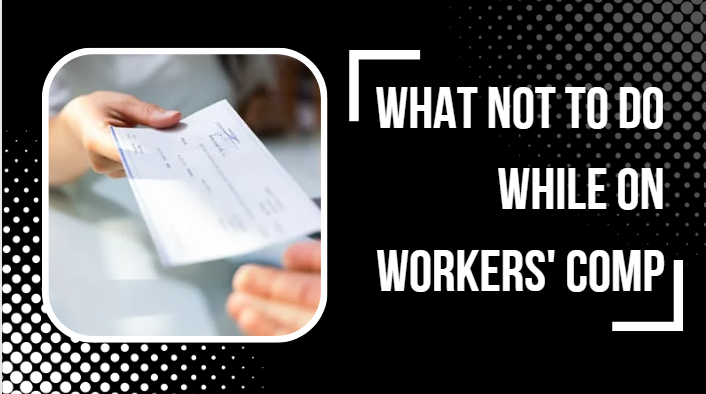What not to do while on workers’ comp
While seeking or getting workers’ comp benefits, you must act with integrity and be honest and informed about the entire process. In this article, we’ll discuss what not to do while on workers’ comp.
You may be denied benefits if you contravene the rules or do not undertake the process in a timely and efficient manner.
Workers’ compensation is a vital benefit for employees who suffer job-related injuries or illnesses. It provides medical treatment and wage replacement while you recover. However, making certain mistakes can jeopardize your claim and benefits. Here is a list of things you shouldn’t do to receive your compensation claims successfully.

What not to do while on workers’ comp
Here are some things not to do while on worker’s compensation:
- not reporting your work injury to your manager or employer on time
- not adequately describing the nature of your injury to your compensation doctor,
- pretending or lying about injuries or symptoms.
- disobeying your doctor’s treatment plan.
- disregarding your doctor’s advice or recommendation.
- not getting back to work when approved or given the go-ahead by your doctor.
Please note that each worker does not have the same compensation claim.
Thus, it is important to use your discretion while deciding matters relating to your claim.
Also, for a swift and healthy recovery, it is important to comply with your doctor’s advice.
For inquiries and complaints about the process or what not to do while seeking workers’ compensation, ensure you contact a professional workers’ compensation lawyer.
Receiving the compensation you are entitled to shouldn’t be difficult. All you have to do is inform your employer, visit an authorized health practitioner, and submit a claim.
However, if things take another turn, your insurance agency may not approve your claim. When you get injured in your workplace, you might get confused about the process. This is why we put together the frequently asked questions below:
Detailed Analysis of What Not to Do While on Workers’ Compensation
Here is a detailed description of what you shouldn’t do while on workers’ comp:
1. Failing to Report the Injury Promptly
One of the biggest mistakes injured employees make is not reporting their injury to their employer as soon as possible. Delayed reporting can lead to doubts about the legitimacy of your claim and may result in a denial. Always notify your employer immediately and document the incident.
2. Not Following Medical Advice
If you are receiving workers’ comp benefits, following your doctor’s recommendations is crucial. Failing to attend medical appointments, skipping prescribed treatments, or not adhering to restrictions can signal to the insurance company that you are not as injured as you claim. This could lead to the suspension of your benefits.
3. Engaging in Activities That Contradict Your Injury Claim
Insurance companies and employers may monitor your activities. If you claim a serious injury but are seen engaging in physical activities like lifting heavy objects, exercising, or participating in sports, your claim may be denied. Always act in accordance with your medical restrictions.
4. Returning to Work Too Soon Without Clearance
Going back to work before you are medically cleared can worsen your condition and jeopardize your benefits. Always get written approval from your doctor before resuming work to ensure you are fit for duty.
5. Not Keeping Records and Documentation
Keep a detailed record of all medical appointments, treatments, prescriptions, and communications with your employer and insurance company. Lack of documentation can make it difficult to prove your claim or dispute a denial.
6. Posting About Your Injury on Social Media
Avoid sharing details about your injury, recovery, or workers’ comp claim on social media. Insurance adjusters often monitor claimants’ social media profiles, and any posts or photos contradicting your injury claims can be used against you.
7. Ignoring or Missing Legal Deadlines
Workers’ compensation claims come with strict deadlines. Failing to file required paperwork on time or missing important legal deadlines can result in a denial of benefits. Stay informed about your case’s timeline and consult with an attorney if needed.
8. Refusing Light-Duty Work Without Justification
If your employer offers a light-duty position that aligns with your medical restrictions, refusing it without a valid reason can jeopardize your benefits. If you genuinely cannot perform the assigned tasks, provide medical documentation to support your claim.
9. Providing Inconsistent or False Information
Always be honest about your injury and symptoms. Inconsistencies in your statements, exaggerations, or providing false information can lead to claim denial and potential legal consequences. Stick to the facts and ensure all documentation accurately reflects your condition.
10. Settling Too Quickly Without Legal Advice
Insurance companies may offer a quick settlement that seems appealing, but accepting it without fully understanding your rights and future medical needs can be a mistake. Consult with a workers’ compensation attorney to evaluate the offer before signing any agreements.
FAQs and Answers
When Do Workers’ Comp Investigators Follow You?
Whenever you submit a claim, the worker’s comp investigator might review or follow you. You may be subject to review if your claim is large, if you have previously submitted a claim, or if the insurance agency has suspicions of fraud.
How long can you receive workers’ compensation?
The length of time you can receive temporary worker’s comp depends on your place of residence or the jurisdiction of your workplace. It can vary from 3 to 8 years. However, there isn’t any time limit for permanent benefits. Some states cease to provide weekly benefits when employees turn 65 years of age.
How long do the majority of workers’ compensation settlements take?
Roughly 16 months
Workers’ compensation settlements can happen soon after a workplace accident (in a matter of weeks or months), or they can go on for years. On average, a worker’s comp case takes sixteen months to be settled. This could lead to a compensation agreement or court proceedings.
What are the benefits of workers’ compensation?
- compensation for income loss;
- healthcare equipment, consumables, and services;
- caregivers’ compensation;
- counseling services;
- Death benefits;
- Funeral benefits.
What is worker compensation, and how does it work?
Workers’ compensation is coverage that offers cash assistance and/or medical services for employees who are injured or become sick directly as a result of their job. This coverage is paid for by the employer; the worker is not expected to contribute to this kind of compensation.
What are the 3 kinds of compensation?
There are three kinds of compensation that are provided to an employee. They are intangible, direct and indirect compensation.
What are the leading causes of workers’ compensation?
Here are among the leading causes of injury and workers comp, based on EMPLOYERS® claim data:
- Lacerations
- Sprains and strains
- Contusions
- Burns
- Eye Injuries
- Fractures
- Cumulative or Continuous Trauma.
What is the objective of compensation?
The purpose of compensation is to provide an attractive payout to employees in order to encourage them to stay working at a particular business or company and be committed to attaining that organization’s goals
What are the four major employee benefits?
The most popular types of employee benefits provided today are
- Medical insurance
- Life insurance
- Disability insurance
- Retirement contributions and pension plans
What are the five principles that worker compensation is built on?
The Meredith principles (no-fault compensation, collective liability, security of payment, exclusive jurisdiction, and administration by independent boards). This is the principle that established the foundation for workers’ compensation systems in Canada and the United States and largely remains so today.
Which profession has the largest worker’s comp claims?
- Construction: Construction workers are among the most hazardous jobs in America.
- Manufacturing: Similar to construction, manufacturing is a hazardous industry.
- Healthcare.
- Warehousing and transportation.
- Retail.
- Agriculture, Fisheries, and Forest Management.
Who is in charge or makes decisions for compensation?
HR professionals are often in charge of handling compensation, making sure that wages and bonuses are attractive, and that benefits are tailored to suit the ever-evolving needs of the workers.
Conclusion
Navigating a workers’ compensation claim requires careful attention to detail and compliance with all legal and medical guidelines. Avoiding these common mistakes can help ensure you receive the benefits you deserve while focusing on your recovery. If you have any doubts or challenges, consulting with an experienced workers’ compensation attorney can provide valuable guidance.
We hope you found this article helpful. Check out other related articles below.
Recommended:
What do Basic Industries Jobs Pay (2025 Update)
Good Excuses to Leave Work Early
How much unexcused absenteeism is acceptable per year?
How to Write a Letter Asking for a Raise [Updated Example]
